Posted April 5, 2017 by Nicky in Reviews / 0 Comments
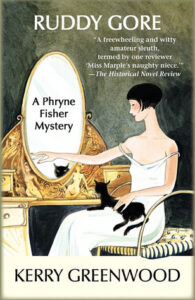 Ruddy Gore, Kerry Greenwood
Ruddy Gore, Kerry Greenwood
I might’ve enjoyed this a bit more the second time than I did the first time, though it’s by no means one of my favourites. It does introduce Lin Chung, but I don’t really enjoy Phryne’s attitude to female characters like Leila Esperance. It’s that slightly bemusing attitude that all actors are the same, and all musicians, even to the extent that all trombonists are a pain in the neck and inclined to murder (see: The Green Mill Murder), and following that attitude, the consequent assumption that all actresses are fluttery and silly and not very smart.
Still, the puzzle comes together well, and it is the book that introduces Lin Chung and all the connections his family will bring. There’s a nice social awareness to the way Lin and Phryne are treated in society, making it more than just wishful thinking — even if Phryne herself is over-the-top liberal. Or perhaps that’s not the term for Phryne, just… “permissive”, maybe.
Rating: 3/5
Tags: book reviews, books, crime, Kerry Greenwood, mystery, romance
Posted March 28, 2017 by Nicky in Reviews / 0 Comments
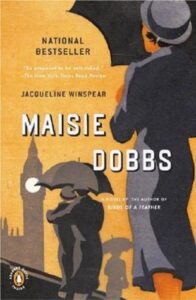 Maisie Dobbs, Jacqueline Winspear
Maisie Dobbs, Jacqueline Winspear
I had high hopes for Maisie Dobbs as the series that would take over from Phryne as my current new comfort reading. I don’t think Maisie is the detective for me, though; for a lot of this, it felt more like the focus was historical fiction that detective fiction. There’s a big digression in the middle which eventually leads up to Maisie’s interest in being a detective, but it’s mostly about her character and the issues of class she’s faced. There’s something very cold about it — for example, the fact that she never went to see the man she’d intended to marry after his operation. She feels more like Sherlock Holmes than Peter Wimsey. Which is fine, but not what I’m interested in.
In terms of the mystery, well, any sense of urgency gets taken away first by the fact that there’s a massive flashback section, and secondly by the fact that Maisie doesn’t face any of the dangers personally. She doesn’t even meet many of the characters involved in the mystery more than once or twice. And she relies heavily on a “shiver down her spine” to tell her what’s going on. Sure, instinct, okay, but… it’s just too perfect, too precise, even alongside the many notes she takes. It’s more like precognition than detection, and I don’t think it’s intended to be supernatural.
I might give the second book a try, because there are aspects of the character and the context that I quite enjoy. I was curious/interested enough to finish this book, after all. But I’m not really feeling it at this point.
Rating: 2/5
Tags: book reviews, books, crime, historical fiction, mystery
Posted March 25, 2017 by Nicky in Reviews / 0 Comments
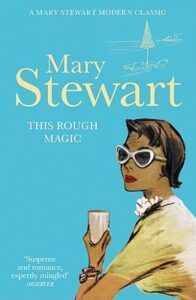 This Rough Magic, Mary Stewart
This Rough Magic, Mary Stewart
If you know Mary Stewart’s work, you know what to expect from this one — which is entirely why rereading her books is comfort reading for me, of course. It has danger, a plucky heroine, a mystery involving smuggling and, possibly, murder… and a handsome young man with whom, of course, the heroine falls utterly in love. Not without some rocky bits along the way, including not being entirely sure which one of the potential love interests is actually a bad guy.
The bad guy in this book gives me chills at times, in his utter amoral self-absorption. There are moments when you think he might be decent, but no. Still, I find the heroine’s relationship with both men delightful — she stands up for herself, gives as good as she gets, and weighs the evidence to come to a logical conclusion. No “but he seemed so nice” from this lady.
In terms of the usual sense of place and atmosphere you get with Stewart’s books, this one isn’t the best: it’s set on Corfu, and there are a couple of scenes early in the book which really do work. At other times, the condescension to the locals is just a bit too much, even allowing for the work as a product of its time.
Best character: the dolphin, of course.
Solidly enjoyable, featuring one of Stewart’s more resourceful heroines.
Rating: 3/5
Tags: book reviews, books, crime, Mary Stewart, mystery, romance
Posted March 14, 2017 by Nicky in Reviews / 0 Comments
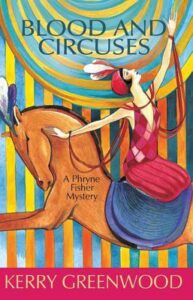 Blood and Circuses, Kerry Greenwood
Blood and Circuses, Kerry Greenwood
In this installment, Phryne leaves behind her safe and comfortable house to do some slumming with the circus. She’s implausibly great at everything, of course, so it’s no surprise she learns how to do some trick riding. It’s also no surprise that her lovers are a clown and a carnie — and neither of them mind.
I was tempted to drop my rating from four stars to three this time when I think about how dramatic this one gets. There’s a lot of violence, with a whole gang situation. And there’s also attempted rape and personal danger for Phryne herself. For a series I normally view as relatively cosy, that felt like a bit much. But then, if you think about it, it’s not much more over the top than the anarchists of Death at Victoria Dock or some of the later stuff Phryne does for Lin Chung.
Also, there’s a bit where the clown is almost violent with Phryne, against her will — sorry, no, not having had sex for a long time is no excuse for that.
On the other hand, I enjoy Jack’s half of the story. An intersex individual is always a bit of an invitation for an author to mess up. Greenwood mostly does not, and Jack is satisfyingly brusque in ordering his subordinates to refer to the individual by their chosen name and pronouns. There’s also a fun friendship developing between unlikely characters in the form of Lizard Elsie and a former acrobat. So a tentative four stars it remains.
Rating: 4/5
Tags: book reviews, books, crime, Kerry Greenwood, mystery
Posted March 9, 2017 by Nicky in Reviews / 0 Comments
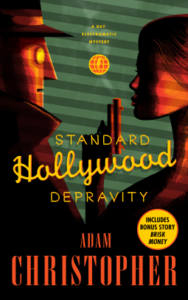 Standard Hollywood Depravity, Adam Christopher
Standard Hollywood Depravity, Adam Christopher
Received to review via Netgalley, publication date 7th March 2017
Just like Made to Kill and Brisk Money, this is an entertaining story — imagine Chandler’s noir detectives, that kind of world, but add in one robot detective-become-assassin and his profit-orientated handler (actually a computer). It’s full of references and hat-tips to Chandler’s era, and though it doesn’t have Chandler’s flair with words (few people do), it’s well written and goes down easy. It’s also reasonably clear of sexism, racism, and Chandler’s other such vices.
This story in particular involves Raymond getting tangled up in the antics of various criminal cartels, and all that sort of thing implies. Bullets and assumptions fly, garnering a possibility of some grudges being held against Raymond and Ada, his handler — and we end the story with Ada and Raymond in a pretty good position. All ready for the next novel, since this is marked as 1.5 in the series on Goodreads?
In any case, this is readable whether or not you’ve read Made to Kill and the short story Brisk Money, but it is worth reading those for extra background and a better understanding of Raymond, his capabilities, and his limitations. The ARC version I read bundled in Brisk Money, so you could comfortable skip to that and read it first before going back to read Standard Hollywood Depravity.
Meanwhile, I never seem to have reviewed Brisk Money itself, and the release of this novella seems like a prime opportunity to do so — so watch out for that review coming sometime soon as well.
Rating: 4/5
Tags: Adam Christopher, book reviews, books, crime, mystery, SF/F
Posted March 7, 2017 by Nicky in Reviews / 0 Comments
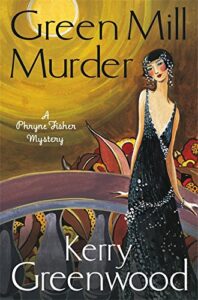 The Green Mill Murder, Kerry Greenwood
The Green Mill Murder, Kerry Greenwood
This book wins for the wombat ex machina alone.
Other than that, on a reread this felt a bit all over the place. There are two overlapping mysteries: one a murder, and one a disappearance. There’s two romances, one of which actually makes me feel kind of squicky inside now I think about it — it’s not often Phryne makes a judgement about who to sleep with that I really disagree with (heck, that’s the point of Phryne; she makes her own decisions)… but one of the two is certainly twisted in his morality, and Phryne does suspect that from the start. I don’t really get the appeal of him, either.
All the same, the book features Phryne being the delight she always is. She protects a queer friend-of-a-friend from the attentions of the vice squad, flies a plane solo to find someone, makes her own decisions and puts her foot down when she has to. The found family are more in the background in this one, given that the high point (ha) of the book is Phryne’s solo flight and her time with a man who has made himself almost a hermit — but of course, they do feature.
I’m left a bit befuddled by the way that the nastiness of people and their squiggly morality seems to be somewhat justified by the fact that it gives Nerine, a blues singer, some real blues to sing about. But I would like to hear her singing, from the descriptions…
Rating: 3/5
Tags: book reviews, books, crime, Kerry Greenwood, mystery
Posted March 4, 2017 by Nicky in Reviews / 4 Comments
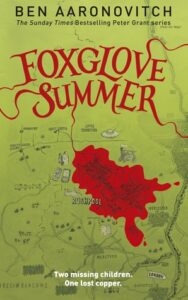 Foxglove Summer, Ben Aaronovitch
Foxglove Summer, Ben Aaronovitch
Once again, this book takes a step back from the main action. It’s not that the events of Broken Homes aren’t alluded to, because they are. In the background, there’s a lot of stuff going on with tracking down Lesley and the Faceless Man. But the main action of the plot is a police procedural dealing with some missing children. I wasn’t really surprised that this book brought in the concept of a changeling child, but it did manage to give the whole idea a couple of twists that did surprise me.
For me, both the strength and weakness of the book is the lack of progression in that main series plot, and the absence of many of the supporting characters. There’s no Lesley to make Peter do the proper policing thing, and there’s no Nightingale for backup. Which leaves Peter on his own, thinking for himself, and showing that actually, he doesn’t need those two. He also keeps showing that though he might not be as good a copper as Lesley, who never misses a beat, he’s a good policeman because he’s a good man. And this book reminds us of the people Nightingale and Peter are meant to be working for — ordinary people who need protection — rather than against (mysterious practioners of unclear motive).
I’m definitely ready for more of the main plot now, but the respite from it wasn’t bad either.
Rating: 4/5
Tags: Ben Aaronovitch, book reviews, books, crime, mystery, SF/F
Posted March 1, 2017 by Nicky in Reviews / 0 Comments
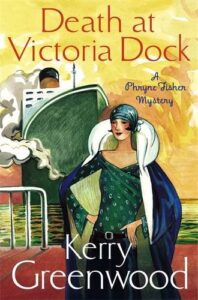 Death at Victoria Dock, Kerry Greenwood
Death at Victoria Dock, Kerry Greenwood
Another fun outing with Phryne, this one opening with a young man dying in Phryne’s arms. That gives us a driven, cold, angry Phryne. It’s always fun to see Phryne shocked right out of her comfort zone and realising that death can touch those around her, and this book gives us a Phryne who is almost (but not quite) out of her depth, with the kidnap of Dot and… well, everything else that happens.
I did find it a little too dramatic this time around, though. Anarchy! Guns! Seances! It’s all a bit sensational, and while I know that’s what I’m likely to get with a Phryne novel, still… this one definitely doesn’t have the cosy feel of some of the others, and there’s a real sense of peril in places which is at odds with the pretty clothes, sexual liberation and epic spreads at lunch and dinner.
Rating: 3/5
Tags: book reviews, books, crime, Kerry Greenwood, mystery
Posted February 22, 2017 by Nicky in Reviews / 0 Comments
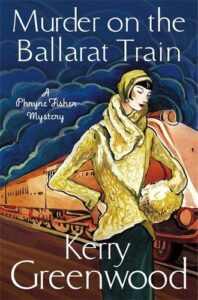 Murder on the Ballarat Train, Kerry Greenwood
Murder on the Ballarat Train, Kerry Greenwood
Another enjoyable outing with Phryne, and this one starts to really bring together her found family with the addition of Jane and Ruth. While I’m noticing some inconsistencies in characters that aren’t Phryne (Dot’s surname changes, for example, and apparently the hair colours of Jane and Ruth too), it’s still fun and those are only really noticeable because I’m reading the books all more or less together, in one glorious reread.
(Note: this is still an excellent way to consume them, though I’m now on book seven and taking a bit of a break.)
My main quibble is still with the mentally ill murderer who suddenly loses it and snaps, ruining all his plans and exposing himself badly. The whole mentally ill killer thing is just so stereotypical; so easy a way out. I mean, it happens, but not usually in this premeditated, coldly planned way. That’s more in the line of a psychopath, which is not quite how the character read. And, people so often forget the real fact: people with mental illness are more likely to be victims of crime, not to be perpetrators.
Rating: 4/5
Tags: book reviews, books, crime, Kerry Greenwood, mystery
Posted February 16, 2017 by Nicky in Reviews / 0 Comments
 Flying Too High, Kerry Greenwood
Flying Too High, Kerry Greenwood
I can’t believe I didn’t notice, first time round, that Phryne manages to move into house number 221… and then adds a B. I love the little references to other detectives — like the Megatherium Trust, for example (a reference to Sayers). Phryne, I love your wit. Or is that Greenwood?
Anyway. Flying Too High is another fun instalment, which I enjoyed rereading. I love that Phryne can fly a plane and that it’s a part of several later stories, and I love the women that come into her story being awesome in their own ways. Dr MacMillan, in the first book, and in this book, Bunji Ross. One’s a female doctor, the other’s one of the most daring fliers in the area. Just gotta love it.
Not all of Phryne’s found family has joined her yet, by this book, and so it’s missing a few of the domestic comforts I love. But it does have Mr and Mrs Butler, who are just perfect. And I adore the loving way Phryne’s clothes and food are all described. She’s so unashamedly feminine, and so unashamed of enjoying the good things in life.
Rating: 4/5
Tags: book reviews, books, crime, Kerry Greenwood, mystery
 Ruddy Gore, Kerry Greenwood
Ruddy Gore, Kerry Greenwood








